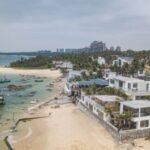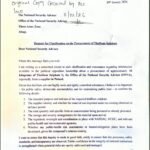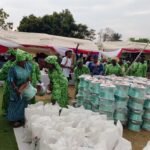The Federal Government has said that Delta and 30 other states will be affected by flood between April and November this year.
The Minister of Water Resources and Sanitation, Prof Joseph Utsev, made the disclosure on Tuesday in Abuja while briefing journalists on the 2024 Annual Flood Outlook for the country.
At the event, the Nigeria Hydrological Services Agency, an agency of the Federal Government, disclosed that a total of 148 local government areas in Lagos, Kano, Delta, and 28 other states had been categorised as high flood-risk areas.
Also, in preparation for the impending flood, various state governments told The PUNCH on Tuesday that they would demolish buildings on river channels, relocate residents, and clear drainages to prevent flooding.
Commenting on the general highlights of the 2024 Annual Flood Outlook the water resources minister said some areas in 31 states were categorised as high flood-risk locations, while others in the 36 states and the Federal Capital Territory would witness moderate flood.
He said, “The 2024 Annual Flood Outlook shows that part of 148 Local Government Areas in 31 states of the federation fall within the high flood-risk areas, while part of 249 LGAs in 36 states of the federation and the FCT fall within the moderate flood-risk areas.
The high flood-risk states are Adamawa, Akwa-Ibom, Anambra, Bauchi, Bayelsa, Benue, Borno, Cross River, Delta, Ebonyi, Edo, Imo, Jigawa, Kaduna, Kano, Katsina, Kebbi, Kogi, Kwara, Lagos, Nasarawa, Niger, Ogun, Ondo, Osun, Oyo, Plateau, Rivers, Sokoto, Taraba, Yobe.”
On the seasonal outlook, Utsev pointed out that the high flood-risk areas would experience the situation between April and November 2024
level of floods in this category is expected to be high in terms of impact on the population, agriculture, livelihoods, livestock and infrastructure, and the environment.
“Part of 72 LGAs across the country fall within the high flood-risk areas in April, May, and June; while part of 135 LGAs in July, August, and September; and part of 44 LGAs in October and November 2024 are within the high flood-risk zones,” he stated.
For the moderate flood risk, he explained that areas in this category would witness moderate flooding between April and November 2024.
“Moderate impact level floods are expected in parts of 63 LGAs within April, May, and June; and in parts of 221 LGAs within July, August, and September; and parts of 100 LGAs within October and November 2024,” Utsev stated.
The minister further noted that flash and urban floods would be experienced in urban city centres across the country.
“Among these are Abakaliki, Abeokuta, Abuja, Asaba, Benin City, Birnin-Kebbi, Calabar, Ibadan, Kaduna, Kano, Lagos, Makurdi, Nguru, Onitsha, Oshogbo, Port Harcourt, Sokoto, Warri and Yola,” Utsev stated.
He said Bayelsa, Cross River, Delta, Lagos, Ogun, Rivers, and Ondo would experience coastal flooding due to the rise in sea level and tidal surge, adding that this would impact fishing, wildlife habitation, and river navigation.
The water resources minister said he had informed the various state governors of the possible flood situation that would be experienced in their respective states this year.
He said this was to ensure the governors make the necessary preparations to effectively mitigate the negative impact of floods in their states.
“To give the 2024 Annual Flood Outlook publication the urgency it deserves, I have notified all the state governors on the level of flooding to expect in their respective states.
“Letters and AFO publications (with maps) have been dispatched to the governors while the exact LGAs to be affected in each state and the expected level of the flood are detailed accordingly.
“I, therefore, appeal to the state governors to give the information in AFO the attention it requires and to act swiftly to contain effects of any flooding incidence to forestall any chaotic situation,” Utsev stated.
On his part, the Director-General of the NIHSA, Clement Nze, urged stakeholders, policymakers, and relevant federal and state government departments and agencies to take note of the information contained in this 2024 AFO and prepare in advance.
“While the Nigeria Hydrological Services Agency is doing its best to carry out aggressive sensitisation and awareness campaigns, we must all join hands to keep clean our environment, waterways (i.e. drainages, gutters, etc.) and flood paths, and maintain proper refuse disposal and waste management practices to reduce the incidence of flooding,” he stated.
explained that floods remained the most frequent natural disaster in Nigeria, with devastating impacts on the poor and the vulnerable populations who live along river courses and depend on the productivity of the river ecosystem and the fertile floodplains for their livelihoods.
“Therefore, flood forecasting and flood early warning are among the most effective flood risk management strategies to minimise the negative impacts of the flood on lives and property, agriculture industrial productivity, infrastructure, communication facilities, interruption of highway traffic and river navigation, and general socio-economic wellbeing,” he stated.
The NIHSA boss observed that Nigeria, like the rest of the world, had been experiencing flood disasters with varying degrees of severity, with 2012 as one of the most devastating on record.
“So far, the 2022 flood has been tagged as the worst recorded flood in the country in terms of the magnitude of its impact.
“The total economic damage to residential and non-residential buildings, infrastructure, productive sector and farmlands from the 2022 floods was estimated at $6.68bn by The World Bank Global Rapid Post-Disaster Damage Estimation Assessment,” he stated.
He noted that to address the perennial flood disasters in Nigeria, President Bola Tinubu inaugurated the National Economic Council Ad-hoc Committee on Flood Mitigation, Adaptation, Preparedness and Response.
Nze stated that the council’s task was to proactively develop a roadmap to enhance Nigeria’s flood mitigation, preparedness, adaptation, and response capabilities









